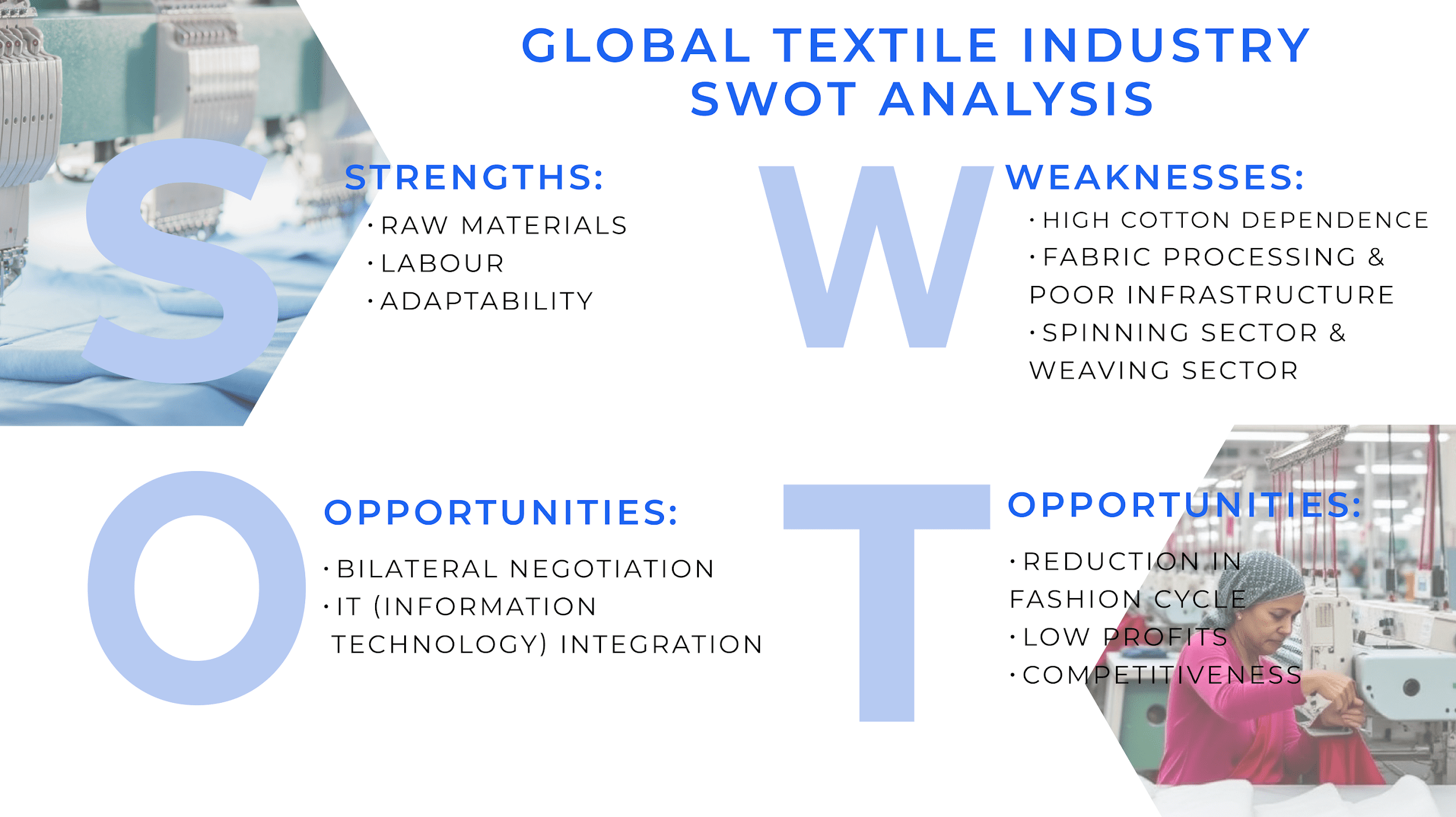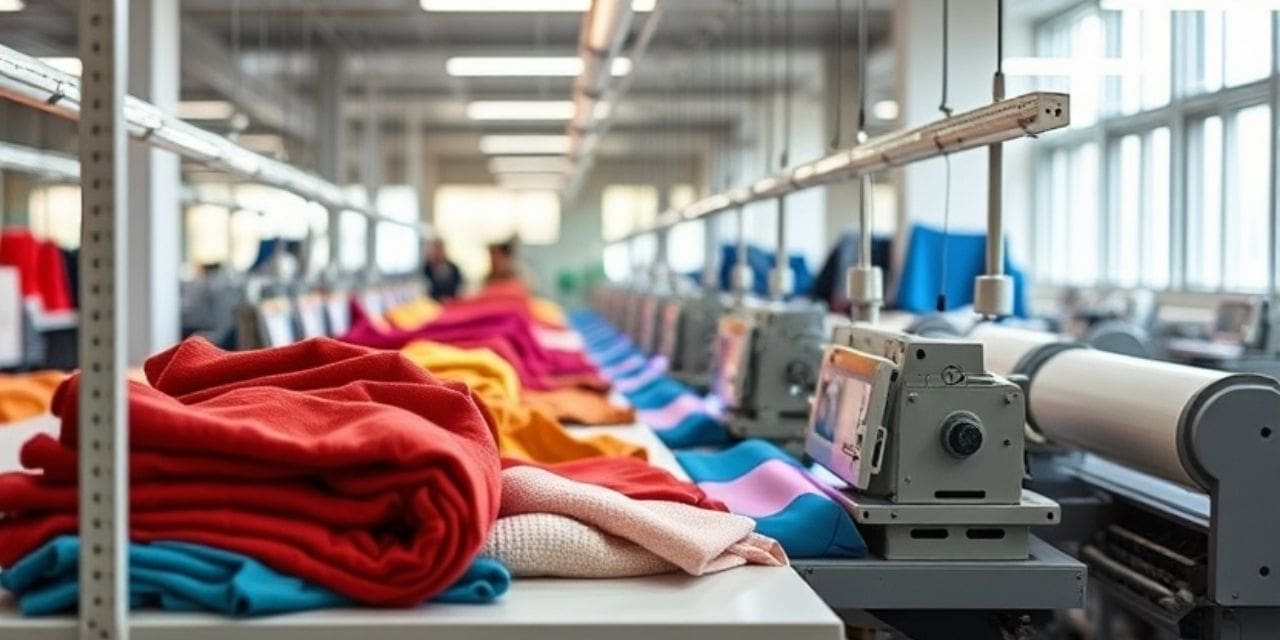By Deepesh Dhingra,
Sr. Marketing Manager, Prophecy Market Insights
What is the Textile Industry?
Textile industry refers to the design, manufacturing, and distribution of textiles across different channels worldwide. The textiles include cloth, clothing, and yarn. The process of textile manufacturing starts from converting the fiber into yarn and then yarn is converted into fabric. These fabrics are further fabricated into cloths by dyeing or printing. Once the cloth is fabricated then it is converted into different products, household items, clothing, upholstery, and many other products. Cotton and Common Natural Fibers are the most widely used fibres for manufacturing yarn. These make up 90% of the total fibres used in the textile industry globally.
SWOT Analysis of the Global Textile Industry

Strengths:
- Raw Materials: The industry has the support of several strong nations for getting raw materials. The industry gets a sufficient amount of raw materials supply when it comes to cotton and natural fibres and is one of the biggest exporters of cotton globally.
- Labour: The strong entrepreneurial abilities and cheap labour have long supported the global textile industry. Different government strategies are also helping the industry to employ skilled labour, which is helping the industry to grow globally.
- Adaptability: The small-scale production of textiles is providing the global garment industry with an upper hand in managing many small and specific orders. The benefits offered to the textile industry are:
- Inexpensive Skilled Labour
- High Availability of Raw Materials
- Diversity of Cotton Fibres
Weaknesses:
- High Cotton Dependence: The textile industry is highly dependent on cotton due to its high production. Several synthetic products, which do not require cotton, like swimsuits, industrial apparel, and skywear, are not available in the country, which is a possible threat to the industry’s growth.
- Fabric Processing & Poor Infrastructure: Fabric processing is one of the weakest links in the textile industry, which is impeding the industry’s ability to compete in global exports. The high costs associated with power and exports are also affecting the industry on a global scale.
- Spinning Sector & Weaving Sector: The spinning sector needs to implement new and advanced technologies to sustain the industry and also has a low shuttleless loom for separating the weft package.
Opportunities:
- Bilateral Negotiation: The textile trade is witnessing rapid growth between the regional trade blocks because of the bilateral agreements between several participating nations.
- IT (Information Technology) Integration: There is a high scope for the industry to grow globally because of the rising number of numerous technological integrations. Some of the leading technologies are Supply Chain Management and EDI (Electronic Data Interchange).
Threats:
- Reduction in Fashion Cycle: The continuously increasing seasons and new fashion trends every year have reduced the fashion cycle. The changing mindsets and fashion sense of the younger generation are also affecting the fashion cycle across the globe.
- Low Profits: Many textile startups in the global textile industry are having doubts about their performance. Low profits are one of the major reasons why startups are struggling to sustain in the global markets.
- Competitiveness: Globally, there are many major textile or fabric producers competing in the industry. These companies have already built a strong customer and retail network. Startups have the fear of initial struggles while networking and marketing their products, which further build a threat of sustaining in the industry.
Industry Analysis
The global textile industry is witnessing substantial transformations starting from the production techniques to the advanced technologies integration, further embracing an era of innovation. The startups in the textile industry are boosting this transformation, with a high focus on unique business models, technology integration, and sustainability.
Key Trends Followed by Textile Startups
- Smart Textiles:
The integration of innovative and advanced technologies into textiles is one of the fastest-growing trends allowing startups to explore smart fabrics and wearable technology. These textiles are embedded with electronics and sensors, which can help monitor health, charge electronic devices, and regulate temperature.
Founded in 2012, Athos is a startup, which is revolutionizing activewear by integrating wearable technology into its line of athletic clothing. The garments of Athos comprise embedded sensors that give feedback on heart rate, performance, and several other metrics. This information helps athletes to prevent themselves from injuries and optimize their workouts for better performance.
According to the Smart Textile Market report by Prophecy Market Insights, the market size is expected to be worth USD 24.01 billion by 2030 registering a CAGR of 26.0%.
- Direct-to-Consumer Models
The increase in digital platforms and e-commerce has made it easier for customers to access a combination of personalized styling services and technology. The textile startups are capitalizing on e-commerce by offering different designs, and direct-to-consumer models for better sales, and production as per the demand.
The company. Stitch Fix, a startup founded in 2011, has revolutionized the industry by integrating personalized styling services and technology. The company’s algorithm analyzes customer preferences and recommends customers with various clothing products, which match their style. The company also predicts trends to create an efficient shopping experience.
To Grow, the Startups are Rapidly Adopting Following Ideas and Strategies:
- Blockchain Technology:
The textile startups across the globe are adopting highly advanced blockchain technology to grow their business. Blockchain technology will help startups to deliver robust data of the whole supply chain, starting from raw material sourcing to the delivery of finished products. The technology also helps consumers to environmental impacts of their clothing and promotes sustainable practices across the textile industry.
- Rental Services:
As the global fashion sector shifts toward a more sustainable future, rental services for clothes are becoming more and more popular. The companies are offering designer and high-quality clothes on rent to increase their profits and also attract consumers to buy their products more.
- AI Integration:
Nowadays, several textile companies are integrating AI (artificial intelligence) technology to design their clothes. This helps them to create clothing that perfectly fits and suits the preferences of the individuals. AI can help companies predict new designs for different body types and decrease waste during the production process.
Top Startups in the Textile Industry Worldwide:
- Bolt Threads
Bolt Threads is a California, U.S.-based textile startup, which is focused on providing advanced materials for textiles and sustainability across the globe. The company has invented Mylo, an alternative for leather manufactured using Mycelium, a mushroom’s root structure. The company has also collaborated with many leading clothing brands, such as Adidas and Stella McCartney, to add Mylo to their products. The main aim of the company is to replace petroleum and animal-based products with sustainable alternatives.
- Worn Again Technologies
Based in London, U.K., Worn Again Technologies is a textile-to-textile recycling company. It has developed a proprietary process that separates cellulose and polyester from textiles produced using mixed materials for recovering high-quality fibre. The company also converts non-reusable textiles into usable raw materials. The company is playing an important role in environmental protection by reducing textile waste on a large scale.
- Syre
Syre is a textile impact startup having a goal to reduce waste and decarbonize the industry via textile-to-textile recycling at a large scale. The company operates by converting used or non-usable textiles into new and high-quality textile products ensuring the continuous cycle of the past and future. Earlier this year, the company raised USD 100 million in funding to boost the decarbonization of the textile industry.
- Syntetica
Syntetica is a textile company that uses green chemistry to produce sustainable synthetic textiles. The company has a breakthrough chemical depolymerization process, which is used to recycle any type of nylon textile waste, including Nylon 6 and Nylon 6,6.
- BioFluff
U.S.-based BioFluff is a textile startup with an aim to create a plant-based materials portfolio from expansion and fashion to toys, packaging, and interior. The company is revolutionizing the textile industry by developing a new an array of new plant-based textile alternatives to the materials derived from animal or synthetic chemicals. The products of the company are produced using shearling and fur under the brand name ‘Savian’.
Conclusion
The textile industry offers a strong ground for startups because of the evolving consumer demands, technological advancements, and sustainability ambitions. The startups in this industry must embrace innovation, especially in areas, including digital transformation, smart textiles, and sustainable production.

